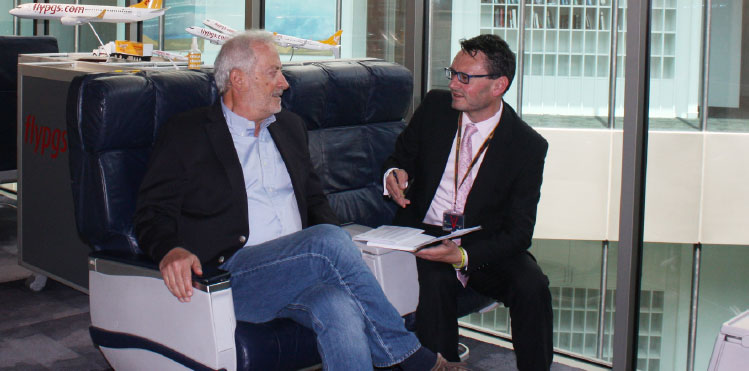
Pegasus’ Haybat is not fazed by the daunting prospect of the new, six runway Istanbul Grand Airport (IGA) and dismisses suggestions that it will overwhelm both Sabiha Gökçen and his own operation. “I think IGA airport is a must, indeed closing Atatürk airport will be a big mistake – a mega city like Istanbul should have all three airports.”
Of course our growth can be maintained – as long as Sabiha Gökçen Airport builds the second runway by end 2016 – and if we get all the traffic rights we want.” Sertaç Haybat, the CEO of Pegasus Airlines, works from one of the modern office developments which have sprung up around Sabiha Gökçen Airport – part of the very prosperity both his airline and the airport have brought to the neighbourhood. Pegasus is inextricably linked to the boom which rocketed Sabiha Gökçen from an airport of 240,000 passengers 10 years ago, to one that will leap past 20 million in 2014. (Unable to ignore this success any longer Turkish Airlines also finally opened a major base with 25 aircraft last year.)
Founded in 1990 Pegasus was reinvented as a low cost carrier (LCC) in 2005 with just six domestic routes. It has grown 25-30% each year since then and will deliver over 20 million passengers in 2014, operating to 80+ destinations in some 35 countries. Its operations differ significantly from other LCCs in Europe which largely fly point-to-point: Pegasus’ international connecting traffic in Istanbul approaches 25% of its total; it truly operates a hub and not just a big LCC base. Indeed Haybat says some things that closely echo Turkish Airlines: “Istanbul is a natural hub given its geographic location, and very convenient, as domestic and international traffic is all under one roof.”
But the Pegasus boss still feels that modernisation has gone only so far and that bilateral air service agreements are heavily biased in favour of Turkish Airlines. “The Turkish-EU bilateral situation is almost liberalised, and even if Poland has not been fully opened to us, we started flying to Budapest in May, and we now have traffic rights to Prague. The Turkish CAA is working hard for us; we just wish that progress could be faster.”
Indeed the situation with the Middle East, North Africa and the Russia/CIS/Eurasian Economic Union is still very limiting. “Turkish Airlines is ‘cherry picking’ as Istanbul is designated as a city and not two airports – we often just get given their leftovers. It’s frustrating as we’d love to fly to almost all cities in the Middle East, we don’t have services to Saudi Arabia, or Jordan and we’d like to serve 10-20 destinations in Russia, and the CIS – yet Pegasus was overlooked again when Turkish Airlines got Sabiha Gökçen-Kiev. Turkey is very popular in these markets – Russians have visa-free travel, although there has been some easing, and I genuinely believe that eventually these bilaterals will disappear.”
Surprisingly Haybat is not fazed by the apparently daunting competitive prospect of the giant new €10 billion, six runway Istanbul Grand Airport (IGA) and dismisses suggestions that it will overwhelm both Sabiha Gökçen and his own operation. “I think the opening of IGA happening within four years is optimistic. But the airport is a must, indeed closing Atatürk airport will be a big mistake – a mega city like Istanbul should have three airports to serve different catchment areas. But even though we’ll have 100 planes when it opens, we don’t want to spread ourselves across two Istanbul airports and, in any case, judging by its costs IGA is likely to be a very expensive airport!”
An LCC; but a reliable partner for new routes
Haybat considers Pegasus to be a very reliable partner. “We’ve dropped hardly any routes since 2005, maybe Sofia, a couple of domestic points, and Frankfurt because we had the wrong slots – then when Frankfurt opened the third runway, we restarted. Now we have 84 destinations and we’re real market-makers – wherever we fly we create traffic because we bring low fares.”
So the question remains: How long can Pegasus keep growing; will it keep all the existing Boeings 737-800s after the 75 A320/21 neos are delivered by 2016; and will it even take up more from the 25 options? (i.e. +150% fleet expansion to 125 from current 50). “Our decision on keeping the -800s after the big Airbus order depends on getting the traffic rights we need – if we can get access to Russia and the Middle East we’ll take all the Airbuses in 2016, and keep the Boeings, doubling the fleet to 127. If not, we may lose the 25 options and the -800s and we’ll have 75 planes.”
Once again Haybat reemphasises the same advantages of geography which have allowed Turkish Airlines to build a super-hub with narrow body aircraft: “Our aircraft have a six-hour range from Istanbul – enough to get us to places like Almaty and Bishkek and the whole of Europe. We have a huge potential market to exploit, so we have no plans for long-haul aircraft. We just need the bilaterals to become more liberal and for Sabiha Gökçen to build its new runway so we can accommodate it all.”







